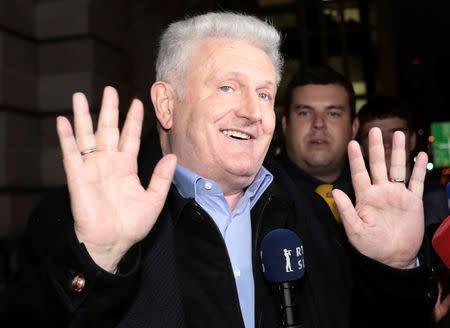UK judge denies Agrokor founder permission to appeal against extradition

By Alistair Smout
LONDON (Reuters) - Ivica Todoric, founder of beleaguered food production and retail conglomerate Agrokor, must return to Croatia to face allegations of fraud involving tens of millions of euros after a London court refused him permission on Thursday to appeal against his extradition.
Todoric is being investigated in Croatia over the crisis at Agrokor, the largest private company in the Balkans with about 60,000 employees.
He denies any wrongdoing and says Croatia has launched a politically motivated process against him. Thursday's decision means he has to return to Croatia within 24 days.
"Whilst I am very disappointed by today’s ruling, it will not stop me from exposing rampant corruption at the very top of the Croatian government and holding those involved accountable," Todoric said after the hearing at the High Court.
"I will not be intimidated by the politically and financially motivated attacks against me," he added.
Agrokor was put under state-run administration more than a year ago after an overly ambitious expansion drive left it weighed down by borrowings.
An audit by PricewaterhouseCoopers (PWC) showed a net loss in 2015 of 3.6 billion kuna ($565 million) against a net profit of 1.2 billion kuna released by the previous management.
LANGUISHING IN A CROATIAN JAIL
Todoric's extradition was approved by district judge Emma Arbuthnot at Westminster Magistrates Court in April.
His lawyer James Hines argued on Thursday that an appeal should be heard as there had been no decision in Croatia to bring Todoric to trial.
Hines said that the investigation’s slow progress meant that had he been extradited after the original decision in April, "he would have been languishing in a Croatian jail while the investigation was ongoing for six months already."
However, judge Duncan Ouseley rejected Hines' argument.
"It is hard to see how this case could not end in a trial ... The district judge was plainly entitled to reach the conclusions ... she did," Ouseley said, adding that the relevant piece of law said nothing about the gap between the decision to try and trial itself. "That is not relevant," he said.
Ouseley's refusal of permission to appeal means Todoric has exhausted the legal process in the English court system.
(Additional reporting by Andrew MacAskill; editing by Stephen Addison)

